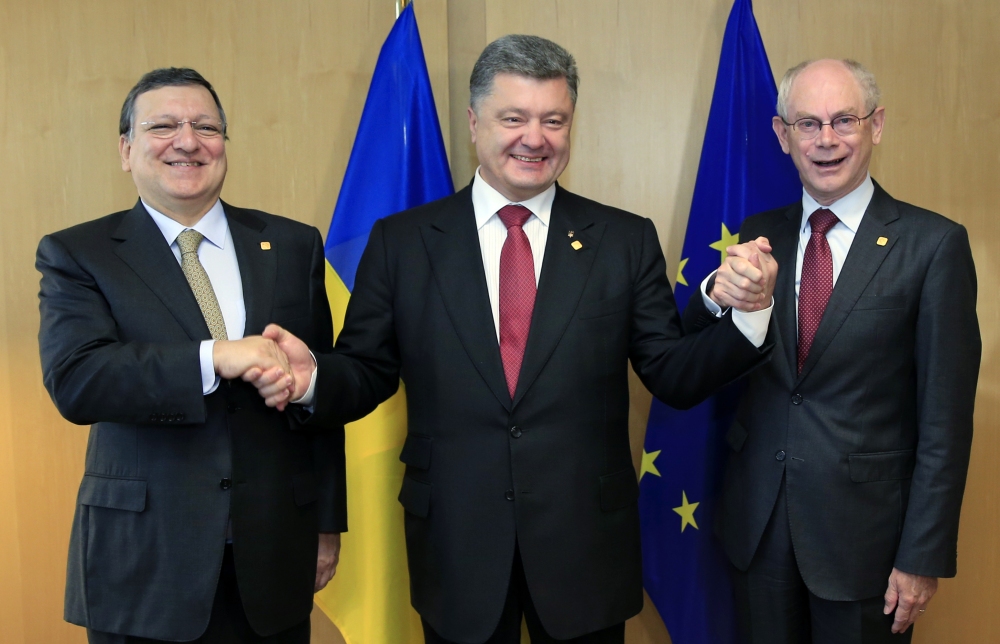BRUSSELS — Over Russia’s objections, Ukraine’s new president on Friday signed a free-trade deal binding his country more closely to Western Europe, sealing the very agreement that triggered the bloodshed and political convulsions of the past seven months.
Russia, meanwhile, fended off for the time being a new, more crippling round of Western sanctions over its intervention in Ukraine, where a fragile cease-fire between government forces and pro-Moscow separatists in the east expired Friday night with no immediate word from Ukrainian President Petro Poroshenko on whether he would extend it.
“What a great day!” a beaming Poroshenko said in Brussels upon the signing of the economic agreement with the European Union. “Maybe the most important day for my country after independence.”
Since it became independent in the 1991 Soviet collapse, Ukraine has been involved in a delicate balancing act between Russia and the West. The Kremlin wants to keep Ukraine, the birthplace of Russian statehood and Russian Orthodox Christianity, in its orbit.
In November, under pressure from Moscow, Ukrainian President Viktor Yanuknovych spiked the EU pact, triggering huge protests that drove him from power. Moscow responded by annexing the mainly Russian-speaking Crimean Peninsula in March, and pro-Russian separatists soon rose up in Ukraine’s eastern provinces.
While Friday’s signing marked a defeat for Russian President Vladimir Putin, who has threatened to cancel trade preferences for Ukraine, the Kremlin made no immediate move to punish its neighbor or the two other former Soviet republics that joined the pact, Moldova and Georgia.
Putin spokesman Dmitry Peskov said Russia will take the necessary measures to protect its markets only when the agreement takes effect. That will take a few months.
Meanwhile, EU leaders decided not to immediately impose new sanctions on Russia for the uprising. But they warned that punitive measures have been drawn up and could be levied immediately.
And they gave Russia and the rebels until Monday to take steps to ease the violence, including releasing all captives, retreating from border checkpoints, agreeing on a way to verify the cease-fire and launching “substantial negotiations” on Poroshenko’s peace plan.
The weeklong cease-fire, which both sides have been accused of violating, expired at 10 p.m. local time. Poroshenko earlier said in Brussels that he would decide whether to extend it after consulting with military and security officials, and his office said that the meeting was underway.
Insurgent leader Alexander Borodai said the rebels were ready to do so and would also soon release the European observers they have been holding for weeks.
At the signing ceremony, Poroshenko reminded EU leaders of the bloodshed in his country.
Ukraine “paid the highest possible price to make her European dreams come true,” he said, asking the EU to pledge that one day Ukraine can join the 28-nation bloc. Membership “would cost the European Union nothing,” he said, “but would mean the world to my country.”
In Kiev’s Independence Square, the site of last winter’s huge protests against Russian domination, balloons the color of the EU’s blue flag were released over the crowd as a rock band pounded out the European Union’s anthem, Beethoven’s “Ode to Joy.”
The crowd of several hundred was far smaller than the hundreds of thousands who jammed the square at the height of the protests. Rain, people getting out of town ahead of a long holiday weekend, and the simmering conflict in the east restrained the mood.
Send questions/comments to the editors.



Success. Please wait for the page to reload. If the page does not reload within 5 seconds, please refresh the page.
Enter your email and password to access comments.
Hi, to comment on stories you must . This profile is in addition to your subscription and website login.
Already have a commenting profile? .
Invalid username/password.
Please check your email to confirm and complete your registration.
Only subscribers are eligible to post comments. Please subscribe or login first for digital access. Here’s why.
Use the form below to reset your password. When you've submitted your account email, we will send an email with a reset code.